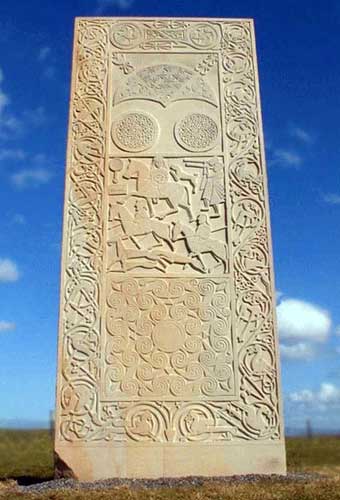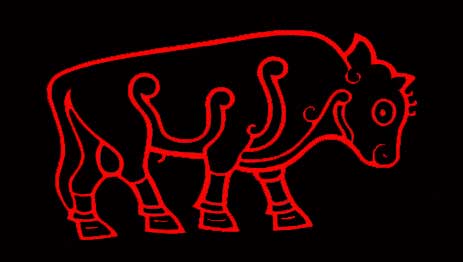FOUNDATION LEGENDS |
|||
 |
‘Cruithnigh cid dos farclam In-iath Alban n-amhra? ‘The Cruithneach, (the Picts), who established them in the noble land of Alban? So begins an ancient poem written in Old Irish concerning the origins of the Picts. This poem forms part of the so-called ‘Irish additions’ to the ‘Historia Britonum’, a masterful piece of work compiled and written in Latin around the late 8 and early 9 centuries by the Welsh historian known as ‘Nennius’. Although the Irish poem was composed around the early part of the 11th century, (and we know that it was certainly written before the death of MacBeth in 1057 A.D. for it mentions him in one particular stanza as if he were still alive), it is believed to draw on much older manuscripts, dating from possibly as far back as the 7 century. To our regret, those earlier manuscripts have long been lost. The poem constitutes a part of what are known as the Pictish ‘Foundation Legends’, and it gives us some of the earliest pieces of information we have on that race of people. They lived in Scotland long before the Scots, (or at least the Scots’ culture), came from Ireland, yet, even so, appear not to have been the original inhabitants of the country. Surprising as it may be to some, we shall see later that a great many Scots of today are probably descended from the Picts and may unknowingly draw many of their attitudes and folk beliefs from them. |
| Scottish readers may also be startled to discover that their roots, far from stemming in Ireland as is generally taught, might possibly lie in lands as far away as Egypt, Greece and Spain. The poem, using William Skene’s 1867 English translation, and in a much truncated form, (for the original runs to 46 verses), continues: |
|
How were they named before they came to attain their sovereignty, From their own weapons. What was the name of their country? Thracia was the name of their country, till they spread their sails, After they had resolved to emigrate in the east of europe. Agathyrsi was their name, in the portion of Erchbi. From the tattooing of their fair skins were they called Picti. The Picts, the tribe I speak of, understood travelling over the sea, Without mean unworthy deeds, the seed of Geloin, son of Ercoil. Necromancy and idolatry, illusion, in a fair and well-walled house, Plundering in ships, bright poems by them were taught. The honouring of sred (rank?) and omens, choice of weather, lucky times, The watching the voice of birds, they practised without disguise. From thence they conquered Alba, the noble nurse of fruitfulness, Without destroying the people from the region of Cat to Forchu. Fifty kings of plundering career, every one of the Race of Eochaigh, From Fergus, most truly, to the vigorous Mac Brethach (MacBeth). Six kings and six times ten of them, who attended to bloody plunder, They loved merry forays. They possessed the Kingdom of the Cruithneach’ |
This ancient poem, and the others like it, could not be called history as such, for it contains much of allegory and myth. Yet, upon examination, myths are often found to contain surprising amounts of verifiable information, and, as will be shown later in this book, such examination appears to confirm two of the main convictions that all the Foundation Legends have in common. Namely, that the Picts came from somewhere in the east, (Thrace, Scythia, etc.), and that they employed a system of government, based on elective matrilinear kingship, that dated back many centuries. |
 |
REX PICTORUM |
Back to Top
Return to Paisley T. A. website
© Ron Henderson 2008-09
